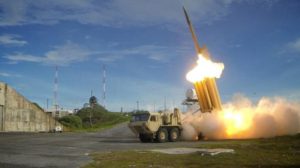
Reuters:
The United States will speed up deployment of the THAAD anti-missile system to South Korea given the pace of North Korea’s missile tests, and it will be stationed there “as soon as possible,” the top U.S. diplomat for East Asia said on Tuesday.
Daniel Russel, assistant secretary of state for East Asia, also told a congressional hearing the United States was in discussions with international partners, including the European Union, to deny North Korea access to international banking infrastructure after its recent nuclear and missile tests.
Russel told the House subcommittee for Asia the timing of the deployment of the Terminal High Altitude Area Defense system was a Pentagon matter.
But he added: “Given the accelerating pace of North Korea’s missile tests, we intend to deploy on an accelerated basis. I would say as soon as possible.”
Asked if the deployment was a “done deal,” Russel replied: “Yes.”
A Pentagon spokesman, Commander Gary Ross, said THAAD would be deployed “as soon as feasible,” but declined to give a specific timeline.
Russel told Reuters last week THAAD deployment was not negotiable as part of efforts to agree on new U.N. sanctions on North Korea after its fifth nuclear test on Sept. 9.
China, whose full backing is widely seen as crucial for sanctions on North Korea to be effective, is strongly opposed to THAAD and some experts have argued it should be part of talks on new U.N. measures.
Russel said China shared concerns about North Korea’s nuclear program and there had been a vast improvement in cooperation on sanctions, even though there was “an awful lot more” Beijing needed to do to tighten them.
He said there had been “a very constructive and honest candid set of ongoing conversations” with China on new sanctions and added: “I hope you will see, as one of the products of that, real headway in the discussions.”
